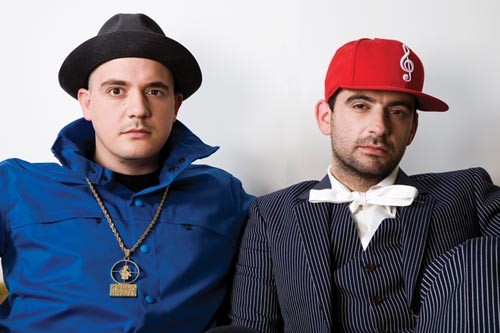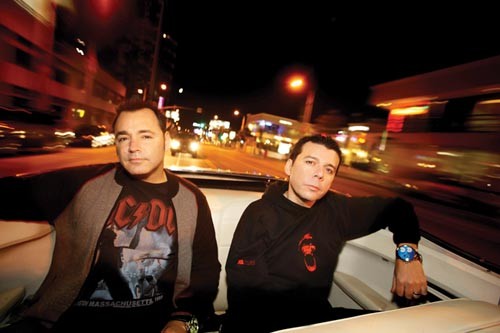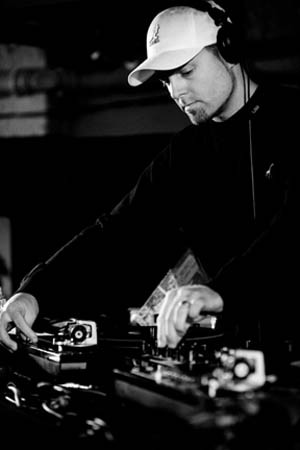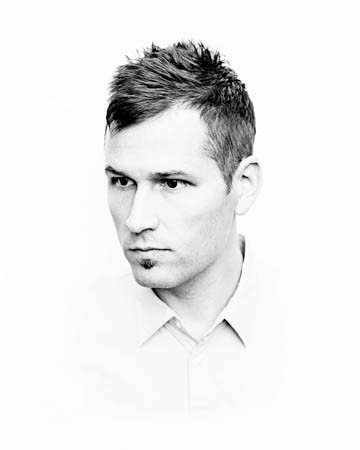Identity Festival, which purports to be the world's first traveling electronic-music event, touches down at First Niagara Pavilion on Aug. 13. In its first year, the festival is a litmus test for whether electronic music is popular enough to warrant a traveling three-stage festival, like those that have become standard for punk rock and heavy metal.
In the wake of record attendance at festivals such as Detroit's Movement Electronic Music Festival and the multi-city Electric Daisy Carnival, Identity appears to be capitalizing on an increasing DJ- and producer-focused fervor. But headlined by Kaskade and featuring artists from DJ Shadow to The Crystal Method, it also may reflect a certain identity crisis in the electronic community.
Electronic music today tends to be divided along the fuzzy line of underground versus mainstream, a dichotomy that grows murkier even as the tools of making electronic music become more and more accessible. Vinyl was reduced to CDs years ago, then CDs to digital files; at the same time, turntables have been replaced by software that are free if you're savvy. Previously, even the most popular electronic artists were largely part of a specialized "underground." But now they find themselves bridging the gap between the electronic underground and the pop mainstream.
Identity Festival headliner Kaskade (Ryan Raddon) has played alongside Tiesto and worked with Deadmau5, and has had tracks on video games like GoldenEye. He is, as he says, "on the front lines, in the nightclubs week in and week out." Like many other electronic artists who now play festivals with attendance in the hundreds of thousands, he grew up listening to more obscure music. He participated in dance-music culture not by way of flashy nightclubs and amphitheaters offering a barrage of Top-40 tracks, but through old-school house DJs and underground labels.
Raddon grew up on a sort of underground electronic-music canon: The Hot Mix 5, and DJs like Ron Hardy and Frankie Knuckles. "Chicago house stuff and early industrial music like Ministry and Revolting Cocks … stuff that was signed to Wax Trax Records, Kraftwerk and all the acid house -- that's how I kinda got into this thing," he explains.
Shawn Sabbo, touring as one half of Manufactured Superstars, sees the popularity of electronic music rising, but questions the importance of distinguishing mainstream from underground. "Electronic music has been pushing more mainstream and tours like the Identity Festival are proving this," he writes via email. "Acts like David Guetta, Deadmau5 and so on are already playing more mainstream venues. The term ‘underground' is such a relative term, anyway. When did hip hop go from being underground to mainstream?"
Sabbo is the co-founder of Beatport.com, one of the biggest online digital music distribution sites made by and mostly for DJs to fill the need for an online marketplace for tracks. Its popularity is proof that the craft has been democratized; anyone can at least try to be a DJ, and many do. "I think dance music is the new ‘pop' and DJs are the new rock stars," Sabbo writes.
Regarding the mainstream-versus-underground dichotomy, Kaskade's Raddon says, "I don't think that exists anymore. I think it's changed so much in the last five years it's hard to understand what is truly underground."
It's clear that Identity Fest views this first attempt through glowstick-framed lenses. The festival will, according to its website, have a "Vendor Village" area, filled with "glow products, rave attire, electronics, and LED gloves." The festival is taking on a rave aesthetic but in a more controlled and commercial atmosphere.
The influx of festivals in the past decade -- from Bonnaroo to Coachella, SXSW to Sasquatch -- can be seen as a reaction to a change in music consumption. Fans download one track at a time, a dollar here, 99 cents there; or they pirate and spend nothing but time looting torrent sites. Music as a commodity has nearly become a thing of the past; music as a cultural event is the new way.
"I think what they're trying to do is take the festival experience and put it on the road a little bit, just because there's so many cities in the middle that don't get it, that don't have opportunities that we get in New York, L.A. and San Francisco, Detroit even," Raddon explains. "I think there's still a lot of cities that are scared or lagging behind or whatever. The promoters in those local markets aren't ready to take the risks."
Without Identity as a vehicle, it's hard to tell if Kaskade would ever make an appearance in Pittsburgh. The flip side is that collectives in this city bring some of the biggest names that nobody knows; Humanaut DJ Collective recently brought in techno superstar DVS1, and the lineup for this year's VIA festival is shining with artists like Four Tet, FaltyDL and noteworthy minimal techno producer Donato Dozzy.
The labels of "mainstream" and "underground" -- and the festivals and events that define them -- end up being a game of numbers and dollar signs. The general-admission ticket price for the Pittsburgh show has fluctuated several times since its initial announcement: $35 and $40 pre-sale specials were offered, then a $20 one-day special, and now what appears to be a permanent $20 offer. (In larger markets, general admission for the festival is as much as $60.)
In a way, the very existence of such a large-scale traveling festival signals that a subculture has "arrived," even as it may seem to dilute that very subculture. The '90s traveling-festival circuit introduced a new brand of feminist pop; Warped Tour emerged not long after as a haven for skater punks; OzzFest caters to metalheads. Identity Festival, for good or bad, is a sign that electronic music has risen beyond raves and the underground -- even if it's also a symptom of the scene's growing pains.
IDENTITY FESTIVAL. 1 p.m. Sat., Aug. 13. First Niagara Pavilion, 665 Rt. 18, Burgettstown. $20-200. 724-947-7400 or www.idfestival.com
















